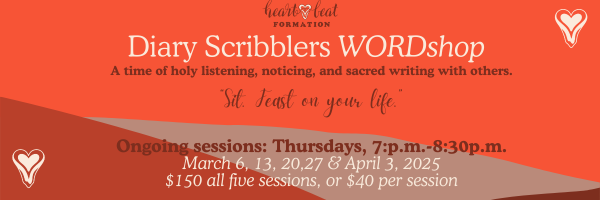Sacred Writing and Listening with Others
Diary Scribblers WORDshop brings together the power of meditation and contemplative writing.
I’ve been keeping a diary for more than four decades: my thoughts, my dreams, my hopes, my vision, my anger, rage, and angst all appear in the pages of these diaries. Through my inkings, I have learned to discern the stirrings of my heart, deepen my prayers with intention, create, and see beyond my habitual way of seeing.
As spiritual director/soul companion, I bring this contemplative practice into group and individual sessions. After a five-minute, emptying exercise — writing down everything you are thinking without stopping until you are empty, then resting in God— one participant shared that it wasn’t until she reread the reading that she realized what she was carrying a heavy burden in her heart.
When it comes to spiritual writing, Henri Nouwen suggests that we say to ourselves, “I do not yet know what I carry in my heart, but I trust that it will emerge as I write.” The participant learned that “writing requires a real act of trust.”1 I encouraged her to come to the page daily to write quickly, whether as prayer, a letter to God, or to examine the day’s graces.
Nathan McCall, author of Makes Me Wanna Holler, uses journaling to help him get back to his spirit when he feels himself coming unglued, not centered. He says in an interview, “Sometimes I need to document, just say, what is happening. I need to journal because life still happens, and with the journaling, I can’t have enough conversations about what’s going on inside of me.”2
Alice Walker discovered the power of giving herself away on paper while reading Anais Nin’s diary. In Alice Walker’s “third diary” (1978) she inks, “I must become more complete, detailed, in my journals. I am guilty of fragmentation.” Shorthand accounts of events for her own use, but journals have further use, I see now.” Happy to be a writer, Happy that it is a part of myself that requires only a pen and paper to exist.”3
Have you given yourself away on paper, mapping out your experiences and perceptions? Keeping a diary as a spiritual practice helps us “grow authentically expressing who we are we often reevaluate how we want to experience and express ourselves.”
And sacred writing and listening with others is writing deeply into what we know and do not know we know, encountering the mystery alone and with another. Writing with others is as gospel writer Matthew notes: when two or three are gathered together, the spirit of God is in their midst. What draws people to write together is a “reciprocity of desire, God’s desire, and their desire.”
Join the Diary Scribblers WORDshop, Thursdays, 7-8:30p.m via Zoom, March 6-April 3. Sit and feast on your life.
Your heart matters,
Angela
Seeds of Hope: A Henri Nouwen Reader, 29-30.
The WORD, Black Writers Talk About the Transformative Power of Reading and Writing, 119
Gathering Blossoms Under Fire, 112.



